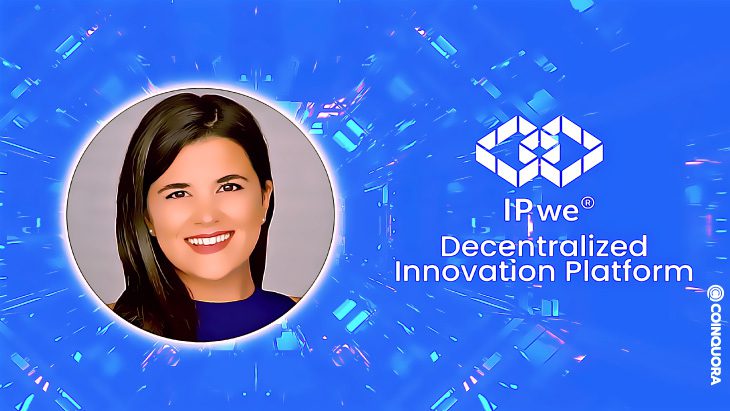IPwe is the world’s first global innovation platform leveraging the power of artificial intelligence and blockchain technology. Through the IPwe Platform, large enterprises, SMEs, owners, those looking to enhance their innovation profiles and those with a legal, technical or financial focus benefit from IPwe’s mission to empower innovation in emerging technologies. IPwe is committed to improving ROI whether measured by dollar returns, jobs created, ventures launched, or problems solved by increasing transparency, lowering costs, and enhancing returns for the entire innovation ecosystem.
IPwe is the first decentralized innovation platform striving to encourage the adoption of emerging technologies. Lavinia Meliti, born and raised Italian with legal background both in Europe and the U.S., and now Global Leader working in business and technology, explains to Coin Quora what IPwe’s mission is — to help companies innovate at scale, thanks to its tech-enabled platform.
Companies supplying new technologies and those successfully adopting them are equally significant contributors to this momentum. We have not fostered an innovation ecosystem that encourages this; our innovation culture is stifled, and we must create the right environment and incentives for innovators,” says Ms. Meliti.
IPwe understands that innovation and transformation challenges are complex, and it built the tools to reduce these complexities, to create a culture of innovation. Thanks to its tech-enabled platform based on AI and Blockchain, IPwe helps companies innovate at scale by accelerating innovation outcomes, embedding a culture of innovation, and solving complex innovation challenges.
Q. Can You Tell Us More About IPwe’s Smart Pools?
IPwe’s Smart Pools are formed in tech areas that are at a very early stage, where there hasn’t been a significant amount of licensing activity. Since they are formed while a technology is still emerging, they can help to build an environment of innovation and cooperation: a single license to a wide patent portfolio encourages implementers to adopt new technologies, safe in the knowledge that they will have access to IP at a transparent and known cost.
Smart Pools aim to simplify and increase licensing transactions between patent contributors (Founders) and licensees (Members), which include SMEs. The Founders are usually medium to large enterprise leaders in the technology area, that make their technology available, while Members are the innovators that productize such technologies.
IPwe’s role in this regard is to act as the sole pool administrator while negotiating licenses on behalf of its participants. Negotiating licenses with multiple enterprises is often expensive and time-consuming, even more so because multiple licenses are owned by multiple enterprises. At IPwe, we aim to simplify the whole process and to ensure access to a one-stop-shop of licenses.
Q. How Is IPwe Helping SMEs?
IPwe aims to remove all barriers to innovation for SMEs, especially discovery and transaction costs, allowing them to focus on their specialized area of expertise using licensed technology. Being itself an SME, IPwe fully understands the challenges that SMEs face when competing with much larger companies having more resources and a much larger bank account.
SMEs with annual global revenue below $1 million have the unprecedented opportunity to get free membership in IPwe’s Smart Pools, meaning free access to top industry patent portfolios, whether it is blockchain, metaverse, barcodes, or quantum computing.
SMEs can compete by spending better and spending smartly. It is for this reason that with a “smart” IP strategy, IPwe strives to encourage increased adoption of tech and innovation by SMEs. In a world where disruption is happening daily at all levels of society, Smart Pools ensures that SMEs can unfold their full potential.
Q. Which Tech Areas Does IPwe Focus On?
IPwe focuses on emerging tech areas such as quantum computing, electric vehicles, 3D barcodes – among others. We recently announced the Metaverse Innovation Program (with the Open Meta Foundation being our first Founder), to promote metaverse technology and industry adoption, which is projected to become a $1 trillion market by 2028. It is designed to permit innovation leaders in the space to make their innovations available to other participants in the industry that can be built on and improved upon.
Finally, IPwe will officially announce the Blockchain Innovation Program at the upcoming North American Bitcoin Conference, on January 19th, 2022. Blockchain technology, according to PwC, is expected to boost global GDP by $1.76 trillion by 2030. Stay tuned to learn more about the program.
Q. How Do NFTs Make Trading IP More Efficient?
OurIP NFTs are not really comparable to the NFTs being traded on the “classic” NFT platforms — as they are tailored to the IP use case. The memes, in-game articles, videos, collectibles, etc. are mainly tokenized to transfer NFT ownership without any right to commercially exploit the tokenized asset from an IP perspective.
Our NFTs are 100% IP. Infrastructurally, the metadata document is the core of our NFTs where all the value-building data points are stored. For the first time, all information relevant for transactions comes together in one place, is standardized against a uniform standard of assessment by our AI engine, and is verified algorithmically. While verification establishes trust, transactional efficiency is safeguarded by standardized information flows and data formats. This setting allows us to reduce the discovery costs massively, for example for due diligence processes, ratings, and valuation of assets.
The tokenization is the cherry on top as the blockchain operational level allows us to apply smart contracts to slash the transaction costs for the conclusion and administration of IP agreements. The current patent market is $180 billion where only 2% of all patents transact. The tokenization of intellectual property is a benefit for innovators and society, is designed to increase transparency, and will allow patents to be more easily sold, traded, and commercialized. It will create a completely new asset class.


